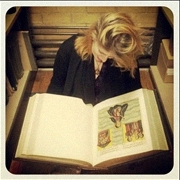Tutor HuntResources English Resources
On Breaking Rules
What to do with `Rules` for Writing
Date : 19/02/2013
Author Information

Uploaded by : Sarah
Uploaded on : 19/02/2013
Subject : English
ON RULES
When I was young my father would recite the rhyme Blue and green should never be seen, and I'd look down at my blue sweater and green skirt and think that what was good enough for bluebells on their green stems was good enough for me.
I've been thinking, as I write at my desk in the Gladstone's Library gallery (which I reserve every night with a pile of paperbacks, convinced it has a magic not cast elsewhere) that a number of hoary old writing rules should be consigned to the nearest pyre.
In a spirit of iconoclasm wholly in keeping with a new year, I propose we dispense with the following, all of which are trotted out as if handed down from Mount Sinai:
Do not open with the weather
On the contrary, to begin by tugging the reader into a physical context that conveys at once something of what's coming is a deft and effective device. Do you remember Jane Eyre, and its opening line There was no possibility of taking a walk that day., and the cold winter wind, the sombre clouds, the penetrating rain? Immediately we're trapped indoors with the unhappy child, with some sense of the regime to which she is submitted, and how narrow a life is when 'taking a walk' is about as pleasing as the day is likely to get.
Orwell - that patron saint of writing skill - knew precisely what he was doing when in 1984 he began It was a bright cold day in April, and the clocks were striking thirteen. Quite aside from the striking clocks, which by the fourteenth word of the novel have turned the whole world upside-down, that 'bright cold day' with its hard monosyllables induces a discomfort that persists throughout the book and for a good while after.
Write what you know
This famous admonition (attributed variously to Twain and Faulkner) has over the years acquired a quite fatuous universality. It's become a suppressant to imagination, and an invitation for countless mildly disaffected students with a group of friends they resent to write slim novels about mildly disaffected students with a group of friends they resent.
Here's the thing: you can write only what you know - that, and nothing else. You can't help it: whatever you write, there you'll be. The mildly disaffected student could - should! - write about Chinese sericulture, or the sinking of the General Belgrano, or how in all Egypt there's only one hieroglyph in only one temple to show how man was first made. But sure enough - and with any luck skilfully, knowingly, honestly - there it would be: the disaffection, and the resentment, and the trouble with friends.
There is no Ice-9; but Kurt Vonnegut wrote Cat's Cradle. Charlotte Bronte never ran from the altar, but wrote Jane Eyre. It's doubtful if Tolkien ever found himself in possession of a Ring of Power; but he knew the brotherhood and the desolation of the trenches, and so in time there was Sam and Frodo, and the Scouring of the Shire.
They wrote what they didn't know, and could never have known; and at exactly the same time wrote what they knew, and what only they knew.
Leave out your adjectives.
Listen up: you're not Ernest Hemingway. He wrote as he wrote, because that was how he wrote; there's no need to emulate his style, nor will you succeed if you try. Besides, Hemingway 'mistrusted' adjectives - he did not despise them. Orwell cautioned against their 'decorative' use - not any use at all.
Consider this - remove the adjective, and Hemingway's famous six-word short story 'For Sale: baby shoes, never worn' becomes a Gumtree advert; leave it, and the pathos is all there.
If you must cling to a rule (there's comfort in it, I know) remember Orwell, who said that 'prose should be a clear pane of glass through which you look'. What is essential is that the reader is untroubled by displays of writing prowess, but that the words on the page vanish, leaving behind a fully realised world into which they're thrown. Too much writing and the glass clouds over; too little, and there's nothing to see on the other side.
'Barely even an art'
There are dozens more, from Elmore Leonard's '10 Rules of Writing' (which work beautifully if you are, for example, Elmore Leonard), to the photocopied sheets handed out in Creative Writing classes all over the world. Do not begin a sentence with 'and' or 'but'; never say 'suddenly'; avoid prologues; never begin with the end. It is best to ignore them all, or smash them up by writing in furious and direct disobedience.
If there are no rules there is at least wisdom, such as this: in one of my frequent periods of writing despair, the writer Edward Fox said to me, "It's not a science. It's barely even an art! It's alchemy - it's magic - it can't be explained."
This resource was uploaded by: Sarah
